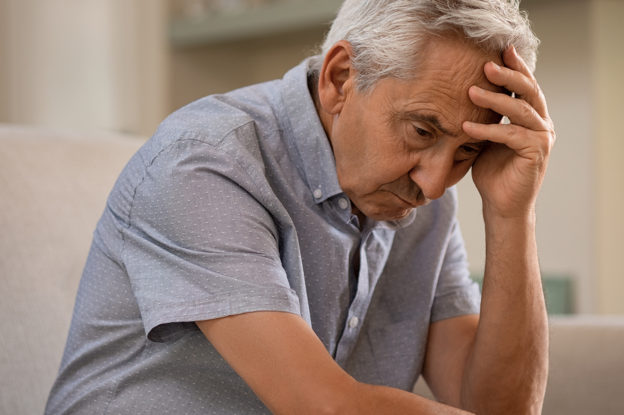By David Blyweiss, M.D., Advanced Natural Wellness
March 15, 2019
Here is one of those strange conundrums that fascinate doctors and scientists around the world.
When it comes to dementia, heart disease and early death, common blood markers can provide some parts of the picture. But they don’t always present the ENTIRE picture.
There is another threat that is a very real health danger to a large proportion of the population. And it is something I probably don’t talk about as much as I could.
It’s called loneliness, a condition that affects almost 25% of U.S. adults who “often or always” feel lonely. Add in those who “sometimes” feel lonely and that number skyrockets to more than half of the adult population.
But it’s not just socially isolated older folks who fall into this category. Indeed, the majority of people who experience feelings of loneliness are under the age of 50. And it is wreaking havoc on their health.
Here are some things you should know about loneliness.
Open your arteries, improve blood flow for a new health miracle...
Did you know your circulatory system has over 60,000 miles of arteries, veins and other blood vessels, if stretched end to end?
But as you age, your blood vessels undergo changes, which may cause them to stiffen, thicken and get clogged.
GOOD NEWS! Doctors have now identified a “Miracle Molecule” inside your arteries that helps OPEN your arteries and IMPROVE blood flow.
It’s what Dr. Valentin Fuster calls it, "One of the most important discoveries in the history of cardiovascular medicine."To you, that means...
- Healthy blood pressure
- Sharper mind and memory
- Skyrocketing energy and muscular strength
- Increased pleasure and passion in the bedroom
- Improved circulation to every cell and organ in your body
Go here to discover a new natural way to significantly boost the levels of this miracle molecule in YOUR body NOW!
- It places you at a much higher risk of experiencing psychological problems such as depression or anxiety.
- Being lonely is associated with a 30% greater chance of developing heart disease or having a stroke.
- Lonely people often have increased levels of inflammation and tend to develop ongoing, chronic back pain as they age.
- It increases dementia risk by about 40% and, in the loneliest of people, more than doubles the risk of Alzheimer’s.
- Loneliness is linked to poor sleep, night-time food binging, obesity and a tendency toward type 2 diabetes.
- People who feel lonesome spend more days in the hospital… and have more hospital readmissions after discharge.
- Feeling alone increases the risk of early death by about 26% in women and 44% in men.
Why is loneliness so harmful to your health?
It likely has to do with the chronic levels of stress that occur when you feel lonely. This, in turn, promotes cortisol production, persistent inflammation and changes in the immune system.
So how can you get rid of that pervasive feeling that is destroying your health?
The 4 Easiest Ways to Overcome those Lonely Feelings
All of my patients are different.
So what works for one lonely patient doesn’t necessarily work for another. That’s why I always sit down with them – one on one – to develop a specific game plan.
Over the years I’ve discovered four simple solutions that seem to offer the best results, depending upon the individual.
Make physical activity a social event. Everyone needs exercise. And it can create a great forum for social interaction, camaraderie and the development of new friendships.
In particular, I’ve found that participating in yoga classes is particularly helpful. The type of physical activity involved in yoga significantly lowers cortisol levels and improves sleep quality. Plus, it includes breathing techniques and meditation to help you de-stress and gain mental clarity.
Are You Suffering From...
- Love handles and a pot belly
- Romance that isn't what it used to
- Forgetfulness and inattention
- Low (or no) strength and endurance
- A sex drive that's shifted into neutral...or worse
If so...you may have Mature Male Burnout. Click here to discover more about this unique condition and what you can do about it.
I believe it’s this mind-body connection that makes it so effective when it comes to developing a natural peace of mind that can help overcome feelings of isolation in your life. (And when you have new friends to share the results with, it makes it even better!)
But other forms of physical activity can be just as effective. Ballroom dancing, tai chi, tennis, golfing, bowling and other activities all place you in a group of people who continually cheer you on, even when they are competing against you.
Donate your time to things that matter the most to you. One of the easiest ways to feel like you’re part of a group is to join like-minded people in their pursuit of a goal.
This makes volunteer work particularly stimulating. And there are so many choices. Check your local pet shelter. Support military veterans at the local VA. Help with your church’s local food drive. If it is important to you, it’s extremely likely that it’s just as important to everybody else involved. Instant connection!
Talk to everyone you meet. I chat with patients all week long, so my weekends are generally reserved for “me” time. But sometimes – usually late on Sunday afternoons – I start feeling a little too isolated.
That’s when I head out to Whole Foods, Publix or Walgreens for some much-needed social interaction with the shoppers and cashiers. It’s a nice little “pick-me-up”.
So, don’t be shy. Talk to the cashier at the store, the people standing in line with you and anyone else you encounter. Not only will it make you feel less alone. You might also learn something new.
Adopt a furry companion. If you often find yourself feeling lonely – even while surrounded by people – adopting a pet may be your best option. These critters offer unconditional love, support and companionship that can’t be beat.
Patients tell me dogs are the best at reducing their levels of loneliness for one simple reason.
Dogs require walking. And when you’re walking a friendly canine, everyone wants to stop and say hello. (Plus, if you sign up for dog-training classes, there are even more friendly folks to meet.)
And here’s a little secret:
If you live in a community that doesn’t allow pets, your doctor can write you a prescription for one as an “emotional support companion”. I’ve done it more times than I can count – and almost every single one of them went through without a hitch.
SOURCES:
DiJulio B, et al. Loneliness and Social Isolation in the United States, the United Kingdom, and Japan: An International Survey. Kaiser Family Foundation. Aug 2018.
New Cigna Study Reveals Loneliness At Epidemic Levels In America. Press Release. Cigna. May 2018.
Petitte T, et al. A Systematic Review of Loneliness and Common Chronic Physical Conditions in Adults. Open Psychol J. 2015; 8(Suppl 2): 113–132.
Valtorta NK, et al. Loneliness, social isolation and risk of cardiovascular disease in the English Longitudinal Study of Ageing. Eur J Prev Cardiol. 2018 Sep;25(13):1387-1396.
Sutin AR, et al. Loneliness and Risk of Dementia. Gerontol B Psychol Sci Soc Sci. 2018 Oct 26.
Wilson RS, et al. Loneliness and risk of Alzheimer disease. Arch Gen Psychiatry. 2007 Feb;64(2):234-40.
Brinkhues S, et al. Socially isolated individuals are more prone to have newly diagnosed and prevalent type 2 diabetes mellitus – the Maastricht study. BMC Public Health. 2017 Dec 19;17(1):955.
Rico-Uribe LA, et al. Association of loneliness with all-cause mortality: A meta-analysis. PLoS One. 2018; 13(1): e0190033.







